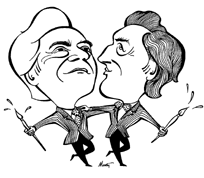|
Deaths
Dr.
Lee | Dr.
Billingham
Dr.
Lee, English and Communication
Dr.
Charles Lee, arts
critic, commentator, author, poet,
and emeritus professor of English,
died on November 20 at the age
of 89.
Born
Charles Levy, in Philadelphia, Dr.
Lee took all his degrees at Penn: his
B.A. in 1933, his M.A. in 1936 and
his Ph.D. in 1955, all in English.
He
was an assistant instructor in English,
1933-36, until he resigned to become
book editor of the Boston Herald-Traveler, 1936-40,
and the Philadelphia Record, 1940-47.
He was a contributing editor to the Philadelphia
Evening Bulletin, 1947-49. In the
early 1960s he wrote a regularly syndicated
book review column for several newspapers.
For 16 years he contributed reviews
regularly to The New York
Times, and occasionally published
verse and poems in national magazines.
In
1946, he returned to Penn as a part-time
lecturer in journalism and became full-time
in 1949. He was promoted to associate
professor of English in 1956 and subsequently
full professor. He taught creative
writing, writing non-fiction and review
and criticism. In the early 1980s Dr.
Lee taught writing of non-fiction and
review and criticism. Dr. Lee became
emeritus professor in 1983.
Dr.
Lee was professor of communications
and the first vice dean of the Annenberg
School of Communications, 1959-65,
under Dean Gilbert Seldes.
He
was also one of Almanac's earliest
editors, serving from December 1955
until May 1959, with Bruce Montgomery
as managing editor. They jointly exhibited
their paintings at the Faculty Club
six times, 1985-1998.
Dr.
Lee wrote 11 books including Love,
Life & Laughter (1990), The
Hidden Public (1958), Snow,
Ice and Penguins (1950), and Weekend
at the Waldorf (1945). His verse
was described as "wise, witty
and richly imaginative."
Dr.
Lee appeared on radio beginning in
1938 and had been connected with television
since 1953. In the 1960s he had a radio
show of cultural commentary on WCAU,
and then became the arts and entertainment
critic, reviewing books, movies and
art at WFLN-FM, 1979-97. He was the
cultural arts critic on WCAU-TV 10,
1965-73.
Dr.
Lee was a member of Phi Beta Kappa,
AAUP, the International Radio and Television
Society, the Association for Professional
Broadcasting Education, and the Association
for Education in Journalism.

Dr.
Lee (left) as seen
by self-portraitist
Bruce Montgomery |
In
1944, he won Penn's first Annual Award
for Meritorious Achievement in Journalism.
For the Annenberg Center's 25th anniversary
gala on April 29, 1996, he presented A
Reminiscence which was published
in Almanac October
1, 1996.
Dr.
Lee is survived by his wife, Ruth Sarah
Micali Lee; his son, Dr. Myles Lee,
and four grandchildren, Jonathan David
Snyder, Rachael Snyder, Allison Lee
and Evan P. Lee.
A
memorial service will be held at the
Annenberg Center on December 13, 3-5
p.m. Memorial donations may be made
to the Trustees of the University of
Pennsylvania, Office of the Secretary,
211 College Hall (please designate
that the donation is in his memory).
back
to top
Dr.
Billingham, Medical Genetics
Dr.
Rupert Billingham, former chair of
the Department of Medical Genetics,
died from complications of Parkinson's
disease on November 16, at the age
of 81. He was one of the most
important scientists in the development
of the field of transplantation, according
to Dr. Clyde Barker, professor of surgery.
Dr.
Billingham was born in England and
educated at Oxford where he was the
first graduate student of Sir Peter
Medawar. He subsequently moved with
Sir Peter Medawar to the University
of Birmingham and then to University
College, London. Medawar's biography Memoirs
of a Thinking Radish reviews Dr.
Billingham's crucial role in the research
for which Medawar was awarded the Nobel
Prize in 1960. Their landmark experiment
was published in Nature in 1953.
The demonstration that a state of "tolerance" could
be induced was the first real suggestion
that transplantation was indeed feasible
as a method of treating diseased organs.
In
1959 Dr. Billingham moved to Philadelphia
to head a research group at the Wistar
Institute. Many of the over 200 papers
he subsequently published proved to
be seminal ones in other important
facets of his field. Dr. Billingham
was the first to recognize and describe
graft vs. host disease, one of the
most important barriers to successful
marrow transplantation, and the first
to describe effective use of an immunosuppressive
agent to prolong allograft survival
and one of the first to study tissue
preservation.
Dr.
Billingham served as chairman of the
Department of Medical Genetics in the
School of Medicine, 1965 to 1971. The
work he did with his graduate students
or encouraged them to do was also crucial
in the development of the fields of
histocompatibility testing, definition
of the mechanisms of transplant rejection,
such as the importance of passenger
leukocytes and the lymphatic circulation
and in elucidation of the immunology
of the maternal fetal relationships.
He
had the gift of being able to gather
around him trainees who were capable
and stimulated by his infectious enthusiasm
and vigorous approach. At least a dozen
of his graduate students or junior
members of his department have gone
on to head up their own departments
or research units.
Dr.
Billingham, although a basic scientist
rather than a clinician, was very interested
in the application of transplantation
to human disease. He was a central
figure in the development of a kidney
transplant program at Penn in 1966.
In
1971 Dr. Billingham moved from Penn
to the chairmanship of cell biology
at Southwestern Medical School in Dallas,
where he served until his retirement
in 1986. He was a member in the Royal
Society, London, the American Academy
of Arts and Sciences, held honorary
degrees from Penn and Trinity College
of Hartford, honorary memberships in Societe
Francaises d'Immunologie and the
British Transplantation Society, the
presidency of the International Society
for Immunology of Reproduction and
of the International Transplantation
Society which dedicated its Congress
to him in 1994.
Dr.
Billingham is survived by his wife
Jean, three children, John, Peter and
Elizabeth, and three grandchildren.
|

